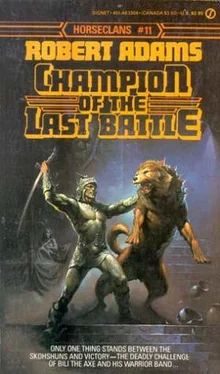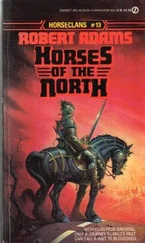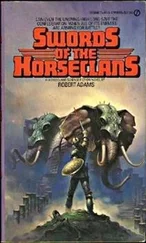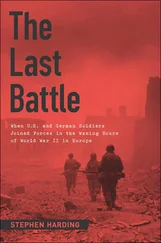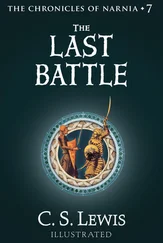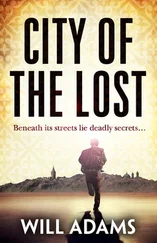Bili did enjoy one distinct and most valuable advantage over his opponent that the Skohshun inspectors could not have suspected. The young thoheeks could devote the full use of his left arm to his shield, disregarding the reins and exerting what little control of his stallion was necessary through means of mindspeak or, occasionally, knee pressure. He and the massive black equine had traveled and drilled and fought as one for long years. A very real love bond existed between them, and in matters of combat the one knew the mind of the other as well as only true telepaths can.
Then, at long last, the trumpet pealed! Jess, the gelding of Sir Djaimz, was startled by the noise and reared, almost trampling the volunteer horse holder before that worthy could loose his grip and scurry clear of the flailing hooves. But Mahvros started smoothly forward, gradually increasing speed and momentum, his rolling muscles bunching and relaxing beneath the horse armor, his gait across the length of the course providing a firm platform from which his rider could fight.
Despite his concentration in aiming his lance and in keeping as much as possible of himself behind the body shield, Bili’s experienced eyes told him a great deal about his onrushing opponent—some good, some possibly bad, but all of it useful.
The chestnut gelding was not so well coordinated as was the black. His gait was choppy and, probably, jarring to the rider, which circumstance most likely meant that Sir Djaimz would aim his point for the larger, surer target of the shield face, rather than essaying the potentially more deadly but smaller and trickier target of Bili’s helm-clad head. This arrangement suited Bili of Morguhn fine, for otherwise, lacking as he did one of the stronger and heavier tilting helms, he just might end with the best part of the lancepoint in his skull.
But another characteristic of that chestnut gelding might make for severe difficulties, injuries, even death. The choppy gait meant that the equine did not always lead with the right forehoof, as did Mahvros and all others of the best-trained destriers. This meant that under certain combat circumstances, an actual collision of the two mounts was a distinct and unnerving possibility. Bili mindspoke this observation to his horse, but Mahvros had, he replied, already noticed and noted the sinister quirk.
But with both big beasts at a flat-out gallop, there was little real time for observing. Suddenly, Sir Djaimz’s point was become a steel flicker just below Bili’s line of vision and the dark-blue—and-silver face of the shield seemed to encompass all of the world.
Bili unconsciously gripped Mahvros’ barrel the tighter, tensed his arm muscles for the coming, powerful thrust and braced his body for the inevitable shock.
Neither man heard the mighty shout that rose up from both sides at the impact. Bili had judged aright, and a shrewdly timed alteration of the angle of his shield sent the Skohshun knight’s lancepoint sliding off the face of the thoheeks’ shield into the empty air beyond, unbalancing Sir Djaimz even as Bili’s hard-driven point took him clean in the helm and bore him far back over his cantle and onto the crupper of the chestnut gelding, his lance clattering from his hand and the man almost following it onto the rocky ground.
Mahvros’ momentum kept him going on westward for several rods before Bili finally could slow and turn him, and by that time Sir Djaimz had more or less regained his seat and his horse control and was hurriedly unslinging a saddle axe only slightly shorter than the Moon Maiden crescent axe that Bili now bore at his own pommel.
Although the Kuhmbuhluhn lines were a tumult of gleeful or bloodthirsty noise and commotion, there was only silence from the Skohshun lines, for matters now looked exceedingly ill for their champion. Bili of Morguhn still remained fully armed, and, did he so wish, there was nothing to prevent him using that long, deadly lance to unhorse, injure, even kill Sir Djaimz well before that worthy was or could be close enough to swing the axe to any effect; and the cheers and shouted bits of advice from his own forces indicated that they all clearly expected him to do just that.
But he did not. Thrusting downward powerfully, he sank the ferrule of the lance into the pebbly ground, then unslung Kahndoot’s balanced, well-kept axe. At sight of this selfless generosity, the Skohshun ranks, one and all, cheered their foemen’s champion, while Sir Djaimz brought up his own axe in a complicated flourish of salute, reflecting that he would not be gladdened by this man’s death. Not that that emotion would keep him from killing when the time came—after all, duty was duty and was not always pleasantly performed.
Neither horse was put to the gallop this time, rather to a fast amble. They met and, for long minutes, circled and feinted. Then Bili’s powerful backhanded buffet came within bare inches of slamming into the section of Sir Djaimz’s helm already weakened by the lance thrust. Barely in the nick of time the officer got his shield into place to block the blow. But the Skohshun returned as good as he got, and for a heartbeat of time, the two strained to wrench loose their axe blades, each sunk deeply in the dense hardwood laminate of the other’s shield.
As the two warily began to circle and feint once more, with a sound louder than a thunderclap, fiery lightning first struck the distant back wall of the Skohshun stockade. Then, with no perceptible pause, equally ear-splitting explosions of sound heralded the virtual disintegration of the front gate of that stout stockade, both of the front-corner platforms and sizable sections of the front wall as well.
From out of a now-cloudless, blue sky, the deadly lightning struck again—among the tightly formed ranks of the Skohshun pikemen and even among the lines of Kuhmbuhluhners. The cheers and shouts suddenly were become screams of pain and terror. Kuhmbuhluhners and Skohshuns, Freefighters, Ahrmehnee, Ehleenee, Kindred, Moon Maidens, men, women, Kleesahks and horses, all surged in one mob this way and the other, seeking an escape, a haven of safety from this mysterious and terrifying new form of death and injury. The duel, the battle, even the war clean forgotten, the resultant thoroughly mixed mob, both mounted and afoot, surged first back to the base of King’s Rest Mountain, then up the winding roadway, through the barbican and across the bridge and into the streets of New Kuhmbuhluhnburk itself, all of the long pikes and the more unwieldy items of weapons and equipment dropped heedlessly along the way in that flight of unthinking terror.
“Cease firing!” ordered Genera! Jay Corbett into his transceiver mouthpiece. “All sections cease firing. Cease firing and dismantle weapons. Horse handlers forward. Out.”
Turning to Gumpner, he said, “All right, Gump, you take over from here. Get the mortars and everything else repacked and get ready to march.”
“There’re a few rockets and some mortar bombs left, sir,” replied the colonel. “It might be interesting to see what the effect of them would be on a stone-walled city ... ?”
“No,” responded Corbett, shaking his head. “I’ve no desire to kill or hurt any more of those poor buggers. The barrage was simply to keep them occupied, off our necks until Dr. Arenstein could get away and join us. We’ve accomplished that and, so far as I’m concerned, the action is over and done.”
He turned to his waiting chief-of-scouts. “Johnny, you and Merle find me the shortest, easiest route back to the site of the landslide. My fondest desire, at this moment, is to get my original mission completed and get us all back to Broomtown in one piece.”
As the scouts conferred one with the other, Corbett strode over to where the three Skohshun prisoners sat and dismissed the armed guards, ordering them to fetch back the prisoners’ mounts and arms.
Читать дальше
